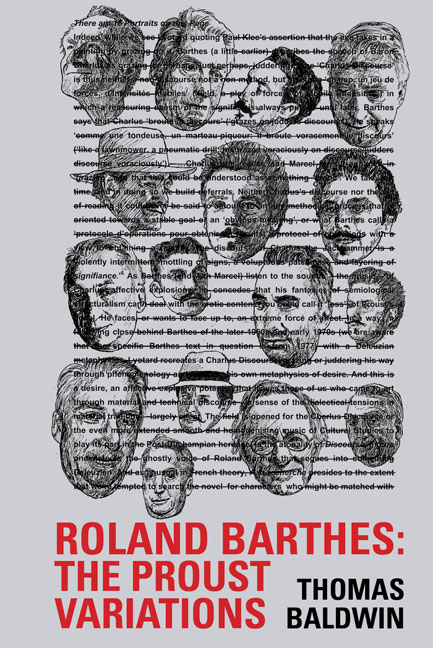Introduction
Summary
By excavating and describing the multiple variations in Roland Barthes’s encounters with Marcel Proust's monumental masterpiece A la recherche du temps perdu (1913–27), this book seeks out new creative tensions between literary texts and critical approaches to them. ‘Proust’ is one of the most powerful names in twentieth-century French literature and indeed in modern European literature more widely. ‘Proustian’, in current usage, designates an ill-defined variety of experiences, cultural and historical points of reference, styles of living and of writing, aspects of sexuality, love, hermeticism, aestheticism, a sense of déjà vu, recovered memory, long sentences and the dominance of art over life. A vague sense of his biography and an awareness of the remarkable scale and difficult syntax of his novel also serve to single Proust out as the ultimate example of a life lived in the name of art, and of literariness as such. Furthermore, as several commentators have noted, objects and artefacts that bear the name – or are conjoined with it – circulate in an economy of Proustian objects, a species of ‘Proustiana’, which includes not only items of clothing and a variety of trinkets, but also cookbooks, self-help guides and works of popular science. Moreover, as André Benhaïm observes, ‘“Proust” (the work, the man, their joint image) has been so much read (that is, been so well assimilated), that it has transcended the canonical library and has been adopted into the culture at large’. The currency of Proust is thus distributed in the streams of cultural production and reproduction: the Proust brand sells.
At the same time, Proust has a currency of a different nature. His novel has been a privileged object of study for literary critics, theorists and philosophers in the twentieth and twenty-first centuries. Roland Barthes figures prominently and distinctively among them. For him, as Malcolm Bowie puts it, A la recherche is the ‘crucial empowerment’: it is no less than an ‘emblematic distillation of literature itself in its triumphant mode’.Barthes, too, is exemplary: he is among the major critics and creative writers of the age (of the post-war era to the present); his career both encompasses French structuralism and post-structuralism and contributes significantly to making them what they are; and he, like Proust, is emblematic of a certain ethics of literature in which plurality, ambivalence and nuance are affirmed over and above stable and secure meanings and interpretations.
- Type
- Chapter
- Information
- Roland Barthes: The Proust Variations , pp. 1 - 16Publisher: Liverpool University PressPrint publication year: 2019

